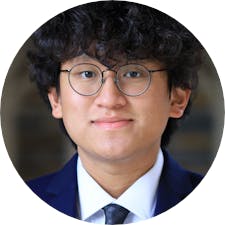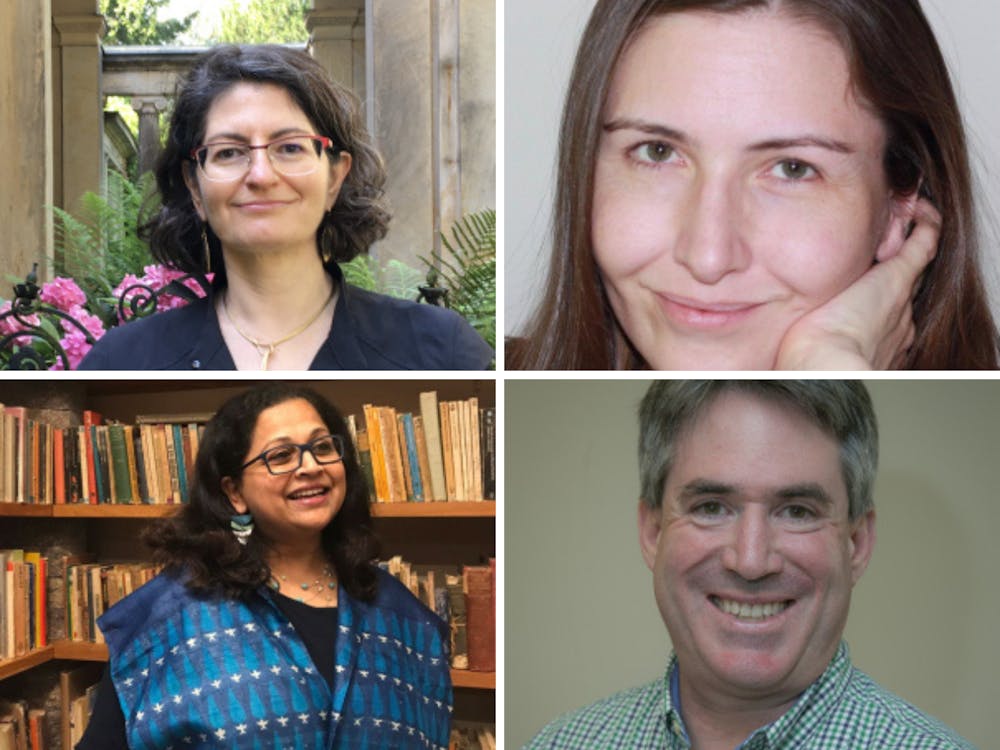Four Duke faculty and three alumni were among the 171 scientists, writers, scholars and artists who were awarded a Guggenheim Fellowship this year.
Duke faculty awardees include Professor of German Studies Stefani Engelstein, Lillian Pierce, Nicholas J. and Theresa M. Leonardy professor of mathematics, Professor of Religious Studies Leela Prasad and Professor of Physics Christopher Walter. Alumni recipients include Lucy Corin, Trinity ‘92, Jon-Sesrie Goff, Graduate School ‘16, and Jennifer Graber, Graduate School ‘06 and Divinity School ‘06.
According to the John Simon Guggenheim Memorial Foundation website, the Foundation grants Guggenheim Fellowships to “mid-career individuals who have demonstrated exceptional capacity for productive scholarship or exceptional creative ability in the arms and exhibit great promise for their future endeavors.”
The 2023 cohort saw recipients across 48 scholarly disciplines and artistic fields and 72 different academic institutions. With four faculty recipients, Duke tied for second with the University of Pennsylvania for the most awardees per university. New York University and the University of California, Los Angeles tied for first with five winners each.
Stefani Engelstein
Engelstein is currently a co-director of the Carolina-Duke Graduate Program in German Studies. Her primary research and subject of her next book focuses on why the sexes have been historically viewed as opposed to one another, rather than simply different.
Engelstein cited that her research drew “really interesting connections” between fields that are typically considered to be distinct areas — medicine, biological research, philosophy, literature and the history of economics and politics. She believes that this made her work stand out during the selection process.
“Right now we’re in a moment where the Supreme Court is making decisions based on those kinds of ideas, and so I think it feels very important to people,” she said. “It’s good to know that there’s that interest in the work.”
Engelstein will use the fellowship grant to take a year off teaching and administrative work to conduct research in Berlin.
Engelstein was also recently awarded a fellowship from the National Endowment for the Humanities and was selected as a Fulbright U.S. Scholar for Germany.
Lillian Pierce
Pierce is the Nicholas J. and Theresa M. Leonardy Professor of Mathematics at Duke and the editor-in-chief of the journal Essential Number Theory, which she founded with Harvard Professor of Mathematics Melanie Matchett Wood, Trinity ‘03.
Pierce’s research spans both number theory and harmonic analysis, two conventionally separate fields. She plans to use the fellowship grant to make progress on a long-term writing project providing an introduction to the intersection between the two fields.
“Over roughly the past ten years, a number of striking discoveries by various research teams have shown that the apparent boundary between the fields is deceptive,” Pierce wrote in an email to The Chronicle. “I think it’s an exciting time because we still don’t know quite how the story will develop: there’s a lot of new research happening right now, in the area surrounding this boundary.”
Pierce was previously a recipient of a Sloan Research Fellowship, a National Science Foundation CAREER grant and a von Neumann Fellowship with the Institute for Advanced Study.
Leela Prasad
Prasad is the director of undergraduate studies of the Department of Religious Studies and a professor in the program of gender, sexuality and feminist studies. She is the vice president of the American Academy of Religion and is set to become its president in 2024.
Prasad’s interests lie at the intersections of religious studies, anthropology, history and literature. She plans to use the fellowship to write a book exploring how Mahatma Gandhi resonates in carceral spaces, according to an email to The Chronicle.
“In my own teaching of Gandhi in prisons in North Carolina and ethnographic fieldwork in India among Gandhi-inspired individuals who have served prison time, I have been learning how such individuals imagine Gandhi and how this imagination yields what we could call a ‘truthful hope’ and an inclusive sense of the collective,” she wrote.
Prasad is a former recipient of two Fulbright fellowships and grants from the American Academy of Religion, the National Endowment for the Humanities, and the American Philosophical Society.
Christopher Walter
Walter, who studies particle physics and cosmology, was previously on sabbatical in Chile, working to help build and commission the Vera Rubin Observatory with funding from the Department of Energy. However, disruptions caused by the COVID-19 pandemic meant that the telescope was not completed as originally scheduled. Walter will use the fellowship grant to return to Chile in 2024 in order to complete the telescope.
“This [telescope] is sort of different, it’s run by a computer, and you’re scanning the entire sky every three nights. It has some strategy for going around it — we’ll do that for 10 years,” he said. “So [by] the end of the period, [it] will measure like 30 billion galaxies.”
Walter’s research explores a currently unknown form of energy called “dark energy.” It could theoretically explain why the universe is accelerating in its expansion despite our understanding of gravitational pulls.
Albert Einstein originally conceived of this phenomenon when researching general relativity, something he dubbed the cosmological constant. He later removed it from his equations, calling it the greatest mistake of his life.
“Once we found out that the universe is getting bigger and bigger and faster and faster, more and more quickly, we had to put [the constant] back in,” Walter said. “We need something like this cosmological constant in order to explain dark energy.”
Lucy Corin
Corin, an associate professor of English at the University of California, Davis, is a novelist and short story writer. Her most recent work includes the novel “The Swank Hotel” and the story collection “One Hundred Apocalypses and Other Apocalypses.”
“The stories I'm working on … in one way or another … involve animals, but they involve animals in ways that I haven't seen as a reader, or that I've seen only in super weird, quirky, obscure kinds of things,” Corin said.
Corin will give the money from the fellowship to the University of California in exchange for reduced responsibilities to devote her time to writing her fifth novel. She describes the fellowship as a “huge affirmation” of her work, noting that the work of writers and scholars is often “solitary.”
Corin also received an American Academy of Arts and Letters’s John Guare Writer’s Fund Rome Prize in Literature and is a literature fellow for the National Endowment of Arts.
Jon-Sesrie Goff
Goff obtained a master of fine arts in experimental and documentary arts from Duke and is currently a program officer for creativity and free expression at the Ford Foundation.
An “accomplished multidisciplinary artist, curator and arts administrator,” Goff’s recent feature-length directorial debut, “After Sherman,” highlights the painful, cross-generational consequences of racism through intimate accounts of the lives of the Black community in Goff’s Black Belt hometown.
Goff has also worked on various other award-winning documentaries. His body of work looks at the legacy of Black land ownership and Gullah Geechee heritage preservation, approaching his efforts from the “paradigm of a social change instigator.
Jennifer Graber
Graber, who holds a doctoral degree from Duke’s graduate program in religion, is currently the Gwyn Shive, Anita Nordan Lindsay and Joe and Cherry Gray Professor of Religious Studies and associate director of Native American and Indigenous Studies at the University of Texas at Austin.
Graber wrote her dissertation at Duke about the history of religion and prisons in early American history. While conducting her research, she noticed that incarceration was also “targeted at” Native American communities, inspiring her interest in Native history and religion.
Graber is currently working on a book about the 19th-century Ghost Dance ceremony, which was incorporated into various Native American tribes. She will be using the fellowship to spend the next year researching and writing about the Ghost Dance, while making visits to tribal communities.
“[The Ghost Dance] called for a real renewal of the Earth itself and renewal of Native population and protection of their lifeways,” Graber said. “But it’s actually something that has an ongoing life in terms of references in native art and native activism.”
Get The Chronicle straight to your inbox
Signup for our weekly newsletter. Cancel at any time.

Jazper Lu is a Trinity junior and managing editor of The Chronicle's 119th volume.

